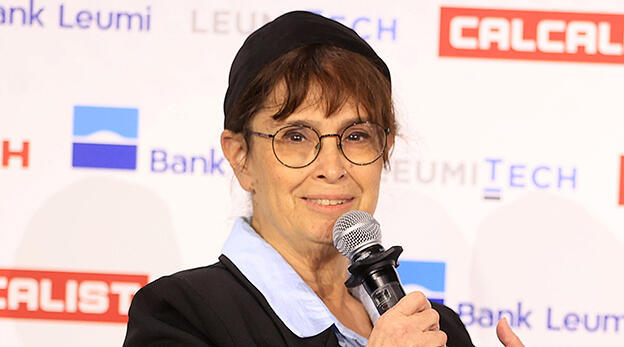
Mind the Tech NY
"We essentially had to invent a form of medicine that we hoped would never be needed"
Dr. Michal Steinman, Director of Nursing at Beilinson Hospital, was speaking at Mind the Tech New York.
Michal Steinman - Mind the Tech
(Tomeriko - Live Focus)
"I never imagined that after 30 years, I would have to treat so many wounded soldiers. I thought I had seen everything, that I had heard everything, but I must say that this is an unprecedented situation—one that takes everyday challenges to a whole new level," said Dr. Michal Steinman, Director of Nursing at Beilinson Hospital, speaking at Mind the Tech New York.
You were responsible for receiving nine of the hostages, including five female soldiers. How did you prepare the medical team?
"There are several aspects to such a mission. First, the professional aspect. We assembled a team and began reviewing all the body’s systems—vision, kidneys, neurology, orthopedics—and started considering the potential medical challenges we would face. In most medical cases, we have information, but here, the details were incomplete and based on assumptions. We didn’t know exactly what had happened to them, so we had to infer what they had endured since October 7. From there, we began rewriting the treatment protocols. We essentially had to invent a form of medicine that we hoped would never be needed."
Steinman explained that, after that, "we brought together teams of doctors, psychiatrists, and nurses to develop long-term treatment protocols—planning for the 100-day mark, the 300-day mark—creating a scenario for every stage of recovery. These simulations allowed us to act in real time when the hostages returned, ensuring that each survivor received a personalized treatment plan."
Beyond the clinical aspect, Steinman emphasized the importance of emotional well-being: "We wanted them to feel as comfortable as possible, almost as if they were in a hotel, while still receiving medical care. That meant thinking about everything—from the lighting and the bedsheets to how we divided the space between a social area and a medical area. We had to be incredibly creative."
The hostages’ families also received special support. "Without their families, the survivors cannot truly heal," said Steinman. "I sometimes think of the reintegration unit as a delivery room, where the survivors are reborn as free people."
What do you say to a survivor of captivity as soon as they get off the plane?
"Even talking about it now brings tears to my eyes because it was such an emotional experience. When the helicopter landed, I was usually with the families by the window, watching the landing. Then, I went to receive the survivors at the hospital. I stood there, and each time the door opened and one of them stepped out, my heart swelled. All I wanted to do was hug them, hold their hands, thank them for coming home safely, and assure them that they would receive the best care. I said that to each of them."
However, Steinman noted that the approach varied for each individual. "Every person is different. Some wanted to be hugged, while others needed space. Each interaction was unique."
Today, Israel faces a shortage of medical staff. There are reports of doctors leaving the country. What should the government do?
"First, the shortage of doctors and nurses is a global phenomenon. Beilinson is fortunate—it attracts top nursing talent because it is a high-quality hospital that leads in medical research. However, in Israel, we must find better ways to compensate nurses and medical staff. When I compare the salaries of nurses in Israel to those in other Western countries, ours are about half. We need to think outside the box. For example, in Israel, people from other academic backgrounds are allowed to retrain and enter the medical field. This kind of professional retraining can help strengthen the workforce in what I believe is the best profession in the world."
Watch the full interview in the video above.















